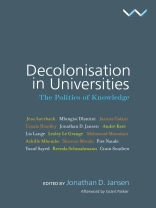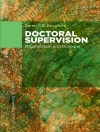Shortly after the giant bronze statue of Cecil John Rhodes came down at the University of Cape Town, student protestors called for the decolonisation of universities. It was a word hardly heard in South Africa’s struggle lexicon and many asked: What exactly is decolonisation? This edited volume brings together the most innovative thinking on curriculum theory to address this important question. In the process, several critical questions are raised: Is decolonisation simply a slogan for addressing other pressing concerns on campuses and in society? What is the colonial legacy with respect to curriculum and can it be undone? How is the project of curriculum decolonisation similar to or different from the quest for postcolonial knowledge, indigenous knowledge or a critical theory of knowledge? What does decolonisation mean in a digital age where relationships between knowledge and power are shifting?
The book combines strong conceptual analyses with novel case studies of attempts to ‘do decolonisation’ in settings as diverse as South Africa, Uganda, Tanzania and Mauritius. Such a comparative perspective enables reasonable judgements to be made about the prospects for institutional take-up within the curriculum of century-old universities.
Table of Content
List of Acronyms and Abbreviations Introduction and Overview: Making sense of decolonisation in universities – Jonathan D Jansen Part 1: The arguments for decolonisation Chapter 1 Decolonising universities – Mahmood Mamdani Chapter 2 The curriculum case for decolonisation – Lesley Le Grange Part 2: The politics and problems of decolonisation Chapter 3 On the politics of decolonisation: Knowledge, authority and the settled curriculum – Jonathan D Jansen Chapter 4 The institutional curriculum, pedagogy and the decolonisation of the South African university – Lis Lange Chapter 5 What counts and who belongs? Current debates in decolonising the curriculum – Ursula Hoadley and Jaamia Galant Part 3: Doing decolonisation Chapter 6 Scaling decolonial consciousness? The reinvention of ‘Africa’ in a neoliberal university – Jess Auerbach and Mlungisi Dlamini Chapter 7 Testing transgressive thinking: The “Learning Through Enlargement” Initiative at UNISA – Crain Soudien Chapter 8 Between higher and basic education in South Africa: What does decolonisation mean for teacher education? – Yusuf Sayed and Shireen Motala Part 4: Reimaging colonial inheritances Chapter 9 Public Art and/as Curricula: Seeking a new role for monuments associated with oppression – Brenda Schmahmann Chapter 10 The Plastic University: Knowledge, disciplines and the decolonial turn – André Keet Chapter 11 Decolonising knowledge: Can ubuntu ethics save us from coloniality? (Ex Africa semper aliquid novi?) – Piet Naude Chapter 12 Future knowledges and their implications for the decolonisation project – Achille Mbembe Afterword: Minds via Curricula? – Grant Parker Contributors Index
About the author
Grant Parker teaches at Stanford University and is also Extraordinary Professor at Stellenbosch University.












